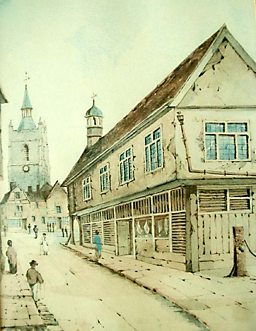Shakespeare's Men perform in Sudbury
Puritans, politics and a puzzle - Records of Early English Drama, Suffolk editor James Stokes weighs up the evidence that the bard's actors performed in Sudbury.
Sudbury still has a number of timber-fronted 15th and 16th century grand buildings. While there is a bit of a mystery as to where William Shakespeare’s own group of actors performed, the burden of proof suggests they did perform in Sudbury.
-
![]()
Much ado near me
Hear more Shakespeare stories on BBC Radio Suffolk
-
![]()
Shakespeare Festival 2016
The BBC celebrates the genius of the bard
And it is possible that they did so having been despatched by the Crown - partly in response to the fact that this fourth largest Suffolk town was becoming increasingly puritanical in its religious views, and parliamentarian in its politics.
Between 1573 and 1623, the town received 25 troupes of professional players.
The town had a tradition of being popular with theatrical players. For between 1573 and 1623, the town received 25 troupes of professional players.
Among them was Shakespeare’s own company, the King’s Men, who staged a play in 1610, for which the mayor and burgesses paid them 5 shillings.
The entry listing the payment in the Sudbury civic accounts does not identify the play that they mounted before the mayor, burgesses, and other worthies of the town. Nor does it tell us the time of year when they visited. Likewise, it doesn’t mention Shakespeare or any other members of the troupe; whether or not he was there, the company certainly had access to his entire canon of plays, except, for the two romances and one history play that he had not yet written as of 1610.
More likely than not, the actors staged one of Shakespeare’s plays in Sudbury.
A Change of Mood in Sudbury
Records of Early English Drama’s Suffolk editor James Stokes writes:

In 1607, things changed dramatically. The mayor, aldermen, and burgesses issued an order forbidding the further use of the Moot Hall for interludes or other plays that were ‘heretofore vsually suffered to be acted within the same Hall.’ Anyone permitting plays would be fined £5. In spite of the absolute nature of this prohibition, it seems most improbable that the town would have denied permission to the King’s own troupe of players to perform in the hall when they visited in 1610.
The order forbidding plays in the Moot Hall also signals another, much greater, moment of historical change concerning theatre in the town of Sudbury. Before 1607, some of the most important troupes of players in the realm had performed in the town—those of the earls of Sussex and Leicester, and the Lords Oxford, Sheffield, and Strange. (Scholars have long argued that Shakespeare may once have been a member of Strange’s Men).
But before 1607, according to the town records, not a single royal troupe had visited Sudbury. After that order in 1607, non-royal troupes disappear entirely from the Sudbury records forever, replaced by a veritable flood of royal troupes between 1607 and 1623.
It is difficult to know whether the prohibition concerning the Moot Hall had any local implications beyond the council’s stated purpose, which was to protect the building since it had ‘byn nowe latlie repaired & bewtified’, but the changes in Sudbury being so sudden and absolute, other motivations seem plausible.
Suffolk was strongly parliamentarian in its sympathies, and in many places strongly puritan in its religious views, especially among the merchant and yeoman populations. Several Suffolk scholars have shown that Sudbury was one of the four centres of puritan non-conformity in the county,
As the fourth most populous town in Suffolk in 1603, and as it was a substantial borough and market town situated on a strategic road from Sudbury through Bury and Thetford to Norwich, the Crown might well have thought it necessary to assert the royal presence through the substantial theatrical resources at its disposal.
One wonders if that is what might well have caught the attention of the Crown, and brought the world’s greatest playwright, his peerless troupe of actors, and the message of their plays, to those timber-clad buildings.
The Puritanical backlash against theatre
One of the most peppery of the Puritans in Elizabethan times is the pamphleteer Philip Stubbes.
Stubbes is perhaps best known for his popular book The Anatomie of Abuses (1583) in which he claims to expose some of the supposed ‘abuses’ in Elizabethan society and the theatre comes in for particular stick.
In Shakespeare and other dramas of the day it is the men who also play female parts. Stubbes and his supporters, known as anti-theatricalists, refer to men who dress up as women as “monsters of both kinds, half women, half men”. They consider such cross-dressing as a depravity.
Carrie Blais, commentating on the life of Philip Stubbes, writes: “Although stage cross-dressing was a necessity brought about by the all-male Elizabethan stage (women in England were barred from performing on the public stage until after 1660), critics have noted that Shakespeare’s use of cross-dressing is complex, and in fact may question the patriarchal structures of his time.
“Shakespeare attempts to undo the policing of gender boundaries and this attempt may perhaps be partly why the anti-theatricalists were so anxious about 'real' gender boundaries.”
Stubbes also argued that plays were magic. They had the power to turn men into aggressive beasts on stage – and that audiences might be drawn into the magic by imitating what they see.
Dismissing them as "filthy plays and bawdy interludes" Stubbes goes so far as to accuse them of being the work of the devil.
His work was a big success – it had four editions – clearly striking a chord with like-minded Puritans who also believed, like Stubbes, that "leisure leads to vice".

Shakespeare on Tour
From the moment they were written through to the present day, Shakespeare’s plays have continued to enthral and inspire audiences. They’ve been performed in venues big and small – including inns, private houses and emerging provincial theatres.

BBC English Regions is building a digital picture which tracks some of the many iconic moments across the country as we follow the ‘explosion’ in the performance of The Bard’s plays, from his own lifetime to recent times.
Drawing on fascinating new research from Records of Early English Drama (REED), plus the British Library's extensive collection of playbills, as well as expertise from De Montfort University and the Arts and Humanities Research Council, Shakespeare on Tour is a unique timeline of iconic moments of those performances, starting with his own troupe of actors, to highlights from more recent times. Listen out for stories on Shakespeare’s legacy on your BBC Local Radio station from Monday 21 March, 2016.
You never know - you might find evidence of Shakespeare’s footsteps close to home…
Craig Henderson, BBC English Regions
Where did Shakespeare’s men perform?
Where Shakespeare’s company might have staged that play in 1610 presents an interesting puzzle. Visiting players most often performed in the local moot hall when they visited a town. But in Shakespeare’s time, Sudbury, uniquely, had two buildings that it called the Moot Hall. The older of the two, called, somewhat predictably, the Old Moot Hall, was the town’s original meeting place for the mayor and burgesses. It dated from 1430 and still stands today, on Cross Street. In the sixteenth century, the town had built a new Moot Hall on Market Hill to replace it. This newer Hall survived until it was demolished in the late nineteenth century, existing today only in pictures and engravings. It would have been in this newer hall that the players, including Shakespeare’s troupe, likely staged their plays before the local power-that-be.
Related Links
-
![]()
Shakespeare Lives
The nation’s greatest performing arts institutions mark 400 years since the Bard's death
Shakespeare on Tour: Around Suffolk
-
![]()
Ipswich: a magnet for Shakespeare's players
Why East Anglia became the favored playing circuit among major troupes
-
![]()
Aldeburgh’s Moot Hall – where Shakespeare's troupe performed
Venue still standing in Suffolk
-
![]()
Dunwich - a destination point for Shakespeare's players
What drew Shakespeare and his players to Dunwich?
-
![]()
Fledgeling Ipswich Theatre shows a passion for Shakespeare
Touring players from Norwich visit Ipswich
Shakespeare on Tour: Around the country
-
![]()
Whitby, wealth and a Shakespearean bachelor night
The Bachelors of Whitby sponsor a performance of Merchant Of Venice
-
![]()
A new king and rebranded Shakespeare’s players head first for Shrewsbury
James I established the ‘King’s Men’ as his official group of theatre players
-
![]()
Shakespeare's men perform before the King at Wilton in Salisbury
A royal audience in Salisbury
-
![]()
Caludon Castle: Did Shakespeare perform here for ‘Henry the Harmless’?
Was Shakespeare there during the 1593 'Plague Tour'?











